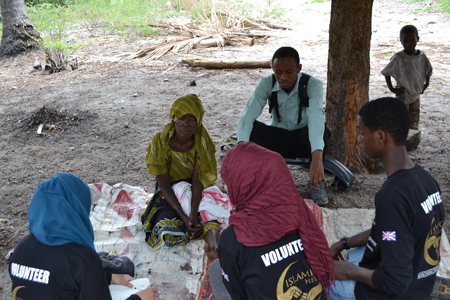Charity, the easiest thing in the world
The hardest thing in the world. Giving to charity is the easiest thing in the world. You drop a few coins into a collection tin or bucket, hand over some pounds from your wallet or go online and make a donation.

It’s the simplest of actions that gives the most satisfying of feelings. It leaves you with a sense of fulfilment and reward, knowing that you’ve performed your duty in helping someone in need.
The majority of us leave it there. Other than maybe asking for feedback reports from a charity or seeing the results of our charitable donations on websites and social media, we’re unlikely to actively pursue it any further. We’ve made our choice by selecting which charity or which cause we’re donating to and played our part in handing over our cash.
Now, here’s the other side of the coin.
Giving to a beneficiary or beneficiaries is fairly straightforward. A charity, like Islamic Help, will identify potential recipients, be they individuals or communities, based on various factors and use those donations to instigate programmes to improve the quality of their lives.
During this process, a decision has to be made. Not the decision who to give to, but the cruellest of judgments – who to turn down. It’s made even more cruel when the person in front of you is as deserving as any other and yet you have to say ‘no’.
Mission Possible
It’s not something that many of us experience in our lives, our charitable interactions being limited to the donation process. So few of us get to understand the full mechanism of charitable giving - that it’s not only about donating and giving to a beneficiary but also involves some heart-breaking yet inescapable decisions.
In that respect, Islamic Help’s Mission Possible programme is unique.
Like other similar programmes it offers young people the opportunity to take part in an overseas deployment and feel they have contributed to the well-being of others while enriching their own lives.
It differs in certain aspects. The young people have to raise the funds for the deployment themselves – in this case £5,000, which can sound a lot but with the help of the Mission Possible co-ordinators is not as daunting as first appears. That money covers their flights and accommodation and the aid they will be delivering.
There’s a system to help them understand why and what they’re participating in, so they gain an understanding of the humanitarian process. Then there’s the actual deployment on which they have the chance to meet beneficiaries and take part in community projects ranging from water programmes to building works and helping schoolchildren.
All of this sounds straightforward and going in with the right mind-set means the participants can experience and fully enjoy a potentially life-changing journey.
Here’s the rub though and what makes Mission Possible unique. They experience the pain and emotional trauma at having to make decisions as to who receives aid and who is turned down. Not from the cosy confines of an office a thousand miles away but with these people sitting in front of them.
Cruel Decisions

Making such decisions is not done using the heart. Emotions may be vivid and overwhelming but they cannot afford to define the end result.
There are certain criteria, the first obviously being how much aid is available. Then there are the questions of which beneficiary will receive maximum value from that aid and how will they best utilise it for their benefit and that of their community. There are interviews with the potential beneficiaries and decisions to be made, decisions that on the face of it can appear cruel but from which there is no escape.
The hardest part of all? Telling someone you cannot give them the help that could transform their lives.
This is what means to those who have to decide. This extract from a volunteers’ blog from our Mission Possible deployment in February 2014 recounts their experience.
“Although she tried to hold it in, Mehvish couldn’t stop the tears because everyone in Africa was always so kind, so content and so grateful, even when we had to turn them away. It was easy to see that the emotions were high. Why did we have to turn people away? Why wasn’t there enough for everyone? It wasn’t fair but it was what it was. She tried to bite her lip and stay strong but it was too much.
So perhaps, the next time a charity is asking for donations, maybe this will help you to think about why they’re doing just that. We hope it does because trust us when we say that it’s not easy to stand there in front of someone and have to say ‘We tried, we stood there and asked people to donate but I’m really sorry, I can’t give you what I don’t have because this is all we raised’.”
Charity. It’s not that easy.
Change your life and the lives of others. Sign up for the humanitarian experience of a lifetime with
The Choice
You have solar panels to give to beneficiaries. There are three people in front of you. You have to turn one of them down. Who would you choose and why?
1. An elderly woman living on her own, caring for her two grandchildren and trying to support
them on an income of £4 a month
2. An elderly man whose wife is paralysed from the waist down. He’s the sole bread winner but they survive mainly due to help from their neighbours
3. An elderly blind man, living with his 70 year-old mother. They rely only on what local villagers provide them.
Read the choice our Mission Possible volunteers made here. (Link to Mission Possible blog Feb 2014 Day 6 Solar Panels)



